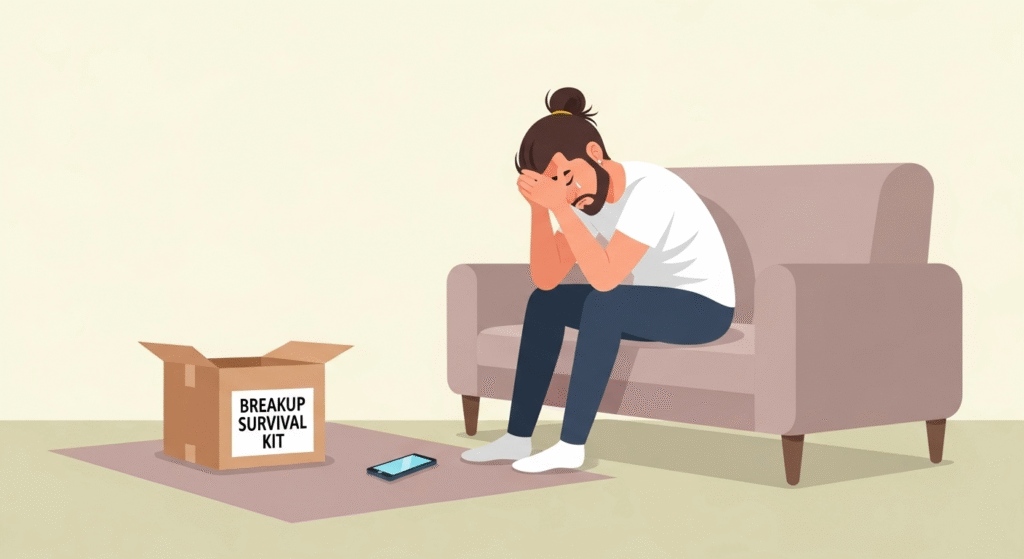Your Breakup Survival Kit: First 24 Hours

Breakup Survival Kit: The first 24 hours after a breakup can feel like being caught in an emotional tsunami. One moment you’re in a relationship, and the next, you’re suddenly facing a future that looks entirely different than you had planned. This initial period is critical – the actions you take and how you care for yourself can significantly impact your healing journey moving forward.
As a breakup recovery coach, I’ve guided hundreds of people through this challenging transition, and I understand the overwhelming mix of emotions you might be experiencing right now. Whether your breakup was sudden or long anticipated, whether you ended things or were blindsided, the immediate aftermath requires special attention and care.
This breakup survival kit isn’t about quick fixes or magical solutions – healing takes time. Instead, I’m offering practical, compassionate strategies to help you navigate these crucial first hours with as much self-compassion and stability as possible. These steps will help you acknowledge your pain, find necessary support, and begin laying the groundwork for eventual healing, one moment at a time.
Acknowledge Your Emotions
The immediate aftermath of a breakup often brings a hurricane of emotions – shock, anger, profound sadness, confusion, relief, or even emotional numbness. Your first instinct might be to push these feelings away, especially the painful ones. However, acknowledging your emotions is essential for beginning the healing process.
Research in emotional processing shows that allowing yourself to experience your feelings, rather than suppressing them, leads to better psychological outcomes. Dr. Susan David, a psychologist at Harvard Medical School, refers to this as emotional agility – the ability to face difficult emotions with curiosity and compassion rather than avoidance.
In these first 24 hours, create space for your emotions to surface naturally. If tears come, let them flow. If anger rises, acknowledge it without judgment. This doesn’t mean you need to act on every emotion, but recognizing their presence is vital. Remember that your feelings, no matter how intense or contradictory, are valid responses to a significant life change.
Journaling can be particularly helpful during this time. Writing about your feelings creates a sense of order amid emotional chaos. You don’t need to write anything profound – simply putting words to your experience can help process what’s happening. Start with simple prompts like ‘Right now I feel…’ or ‘What I’m struggling with most is…’
For those who find meditation helpful, a guided practice focused on emotional awareness can provide grounding. Apps like Headspace and Calm offer specific meditations for difficult emotions and life transitions. Even five minutes of mindful breathing can help regulate your nervous system when emotions feel overwhelming.
- Take time to cry, journal, or meditate to express your feelings.
- Avoid suppressing emotions, as this can prolong the healing process.

Breakup Survival Kit: Reach Out for Support
Humans are inherently social creatures, and we’re not designed to process grief and loss in isolation. One of the most important actions you can take in the first 24 hours after a breakup is reaching out for support. This can be challenging – vulnerability often feels uncomfortable, and you might worry about burdening others. However, connecting with supportive people is crucial for emotional regulation and perspective during this difficult time.
Consider who in your life provides non-judgmental support. This might be close friends, family members, or a therapist who can offer a safe space for your raw emotions. You don’t need to call everyone you know – select one or two trusted individuals who have demonstrated empathy and good listening skills in the past.
When reaching out, be specific about what you need. You might say, ‘I’m really struggling with my breakup right now. Could you just listen while I talk through some feelings?’ or ‘I don’t want to be alone tonight. Would you be willing to come over or video chat for a while?’ Being clear helps others know how to support you effectively.
If your emotions feel overwhelming or you’re experiencing thoughts of self-harm, professional support is essential. Crisis text lines, therapy hotlines, or scheduling an urgent session with a therapist or counselor can provide crucial support during this vulnerable time. Remember that seeking professional help is a sign of strength, not weakness.
Some people find comfort in breakup support groups, either in-person or online. Hearing others’ experiences can normalize your feelings and provide hope that healing is possible. Platforms like Meetup or Facebook often have groups specifically for people navigating breakups and divorce. While joining a group might not be your first action in the immediate aftermath, knowing these resources exist can be comforting.
- Share your feelings with trusted individuals who can offer comfort.
- Consider professional help if emotions feel overwhelming.

Breakup Survival Kit: Engage in Self-Care Activities
The mind-body connection is powerful, especially during emotional distress. While attending to your feelings is important, caring for your physical self provides a foundation for emotional stability. In the first 24 hours after a breakup, basic self-care isn’t indulgent – it’s essential for managing the physiological effects of emotional pain.
Breakups can trigger your body’s stress response, flooding your system with cortisol and adrenaline. This can disrupt sleep, decrease appetite, and leave you feeling physically exhausted. Counteracting these effects requires intentional self-care. Start with the basics: hydration, nutrition, and rest. Even if you don’t feel hungry, try to eat small, nourishing meals. Drink plenty of water, as emotional crying can lead to dehydration. And while sleep might be difficult, creating a restful environment helps signal to your body that it’s safe to relax.
Gentle movement can help process the stress hormones circulating in your body. A walk outside, gentle stretching, or yoga can help regulate your nervous system. Exercise releases endorphins, natural mood elevators that can provide temporary relief from emotional pain. However, this isn’t the time for intense workouts – gentle, nurturing movement is most beneficial right now.
Comfort activities that engage your senses can provide grounding when emotions feel overwhelming. This might be taking a warm shower or bath, wrapping yourself in a soft blanket, listening to calming music, or preparing a favorite tea. These sensory experiences help anchor you in the present moment rather than getting lost in painful thoughts about the past or future.
Equally important is what to avoid during this time. Alcohol and substances might seem like they offer temporary relief, but they typically intensify emotions and disrupt sleep, ultimately making recovery more difficult. Similarly, making major decisions or dramatic changes (like immediately changing your appearance) often stems from emotional reactivity rather than clear thinking. Give yourself permission to focus solely on basic self-care without pressure to ‘fix’ anything in these first 24 hours.
- Engage in activities you enjoy, such as exercising, reading, or hobbies.
- Maintain a healthy routine with proper sleep, nutrition, and relaxation.

Breakup Survival Kit: Conclusion
Navigating the first 24 hours after a breakup is undoubtedly challenging, but the way you care for yourself during this critical period can significantly impact your healing journey. By acknowledging your emotions, reaching out for support, practicing intentional self-care, establishing necessary boundaries, and focusing on the present moment, you’re laying important groundwork for recovery.
Remember that healing isn’t linear – even with these strategies in place, you’ll likely experience ups and downs in the coming days and weeks. What matters most right now is treating yourself with the same compassion you would offer a dear friend going through this experience.
As you move beyond these initial 24 hours, continue building on these foundations. Consider developing a longer-term support plan that might include therapy, support groups, or structured self-care practices. Give yourself permission to heal at your own pace, knowing that each day of self-compassion brings you closer to renewal.
Breakups, while painful, often create space for profound personal growth and eventual new beginnings. For now, focus simply on getting through this day with as much gentleness toward yourself as possible. Tomorrow will bring its own challenges and opportunities for healing, but for today, simply caring for your immediate needs is enough.
